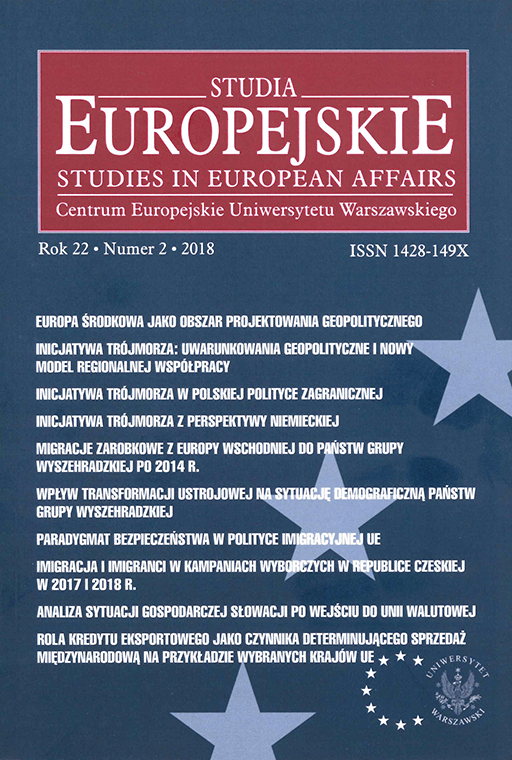
ISSUE: 2/2018
- Volume 22
- Number 2
- 2018
Subscribe NEWSLETTER
Studia Europejskie –
Studies in European Affairs
ISSN: 1428-149X
e-ISSN: 2719-3780
License
Articles published in the journal are under a Creative Commons Attribution – Non Commercial – No Derivatives 4.0 International License
Inicjatywa Trójmorza: uwarunkowania gopolityczne i nowy model regionalnej współpracy
The Three Seas Initiative: Geopolitical Determinants and a New Model of Regional Cooperation
Abstract
The objective of the present paper is to discuss the Three Seas Initiative (TSI) as a project in statu nascendi. The TSI aims to tighten the cooperation of states located between the Baltic, the Black, and the Adriatic seas. The initiative was inaugurated during the Dubrovnik summit (Croatia) in August 2016. The TSI encompasses EU member states. The second summit was held in Warsaw on 6th May 2017. In 2018, the third summit will be held in Romania. The paper will outline objectives the initiative aims to achieve and its determinants. Subsequently, challenges and threats for the EU associated with the initiative will be discussed. Will the TSI fall hostage to thinking in geopolitical categories, or will it
constitute a new model of regional cooperation?
References
Chojan A., Grupa Wyszehradzka w polityce zagranicznej Polski – między współpracą a rywalizacją, „Biuletyn Analiz i Opinii ZE ISPPAN”, nr 4/2016.
Ekonomiczne i kulturowe podstawy Trójmorza (Ankieta Arkanów), „Arcana. Kultura, Historia, Polityka”, nr 5(137)/2017, s. 19–39.
Gniazdowski M., Trójmorze – nowy instrument w polskiej polityce zagranicznej, „Polski Przegląd Dyplomatyczny”, nr 4 (71)/2017.
Kawczynski S., Why Germany should care about B9?, „New Eastern Europe”, 29.06.2018, http://neweasterneurope.eu/2018/06/29/germany-careb9/ (dostęp 4.07.2018).
Kobzová J., The Visegrad Group in Eastern Europe: an actor, not a leader yet, „Visegrad Insight”, no. 2/2012, s. 62, www.visegradinsight.eu.
Olejarz T., Stępniewski T., Grupa Wyszehradzka: status polityczny i specyfi ka działań międzynarodowych na przykładzie inicjatywy Partnerstwa Wschodniego Unii Europejskiej, „Rocznik Instytutu Europy Środkowo-Wschodniej”, nr 11(1)/2013, s. 107–125.
Orzelska-Stączek A., Inicjatywa Środkowoeuropejska a Trójmorze – odmienne koncepcje współpracy w Europie Środkowo-Wschodniej, „Studia Polityczne”, nr 1 (46)/2018, s. 149–169.
Przybylski W., V4 Upgrade: Polish presidency in the Visegrad Group, „New Eastern Europe”, no. 3 (VIII)/July–September 2013, s. 68–74.
Sienkiewicz M., Koncepcja Trójmorza w polityce zagranicznej Polski po 2015 r., „Dyplomacja i Bezpieczeństwo”, nr 1/2016.
Szczerski K., Utopia europejska: kryzys integracji i polska inicjatywa naprawy, Kraków 2017 (rozdział 8: Trójmorze: nowa rola i miejsce Europy Środkowej).
Szumiło M., Prospects of building Intermarium – a regional security system in Central and Eastern Europe, w: Quo vadis humanitas? Wyzwania i perspektywy rozwoju środowiska międzynarodowego w XXI wieku, red. R. Kordonski, O. Struk, K. Sygidus, J. Ruciński, Lwów–Olsztyn 2015.
Ukielski P., Mapa Trójmorza. Przegląd punktów wspólnych i rozbieżności w polityce 12 państw regionu, „Raport Centrum Analiz Klubu Jagiellońskiego”, nr 3/2016, http://cakj.pl/wp-content/uploads/2016/11/Raport3-2016.pdf (dostęp 20.05.2018).
Poland, the Czech Republic and NATO in Fragile Security Contexts, red. Visvizi A., Stępniewski T., „IESW Reports”, Institute of East-Central Europe, December, Lublin 2016.
Language: Polish
Pages: 33-43
How to Cite:
Harvard
Stępniewski, T. (2018) "Inicjatywa Trójmorza: uwarunkowania gopolityczne i nowy model regionalnej współpracy". Studia Europejskie – Studies in European Affairs, 2/2018, pp. 33-43.